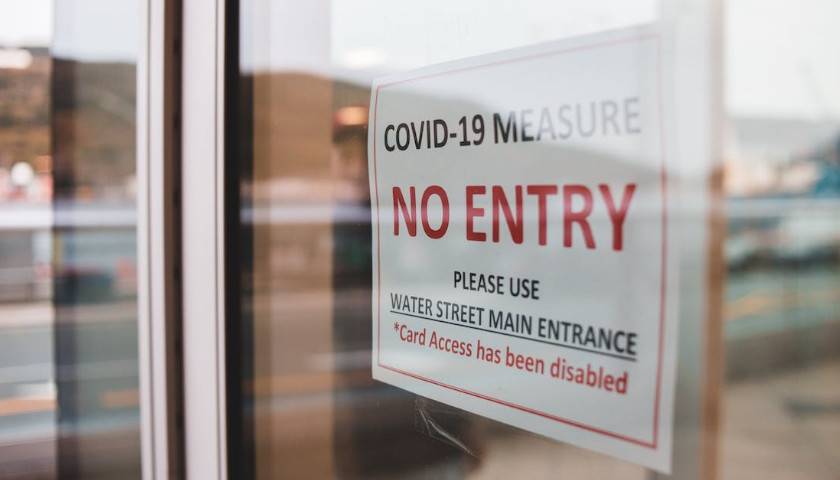by Nick Murray
Most Americans are likely pleased that when they turn on their television, no longer are there talking heads and public health figures breathlessly discussing COVID-19 case counts and deaths. Broadly, the media as a whole is no longer incessantly reporting on the topic, and nationally, the federal public health emergency declared for the COVID-19 pandemic terminates on May 11.
While the old signs of the pandemic have virtually vanished, Americans won’t forget what their governments did to them.
Widespread business closures crippled entire industries, forced people into unemployment and massively disrupted supply chains, all of which contributed to the boom of inflation we’ve experienced (in addition to printing trillions out of thin air).
There were also school closures across the country that needlessly disrupted the schooling of the next generation, robbing them of their education and once-in-a-lifetime opportunities like graduation, sporting events and senior proms.
These actions were taken by chief executives under states of emergency declared for the COVID-19 pandemic. For most Americans, it was their first exposure to the expansive nature of emergency power laws and how dominant they make a single individual in times of panic and uncertainty.
Much to the chagrin of those who clamored for the widespread closures and disruptions to everyday life, there is no nationwide standard for how states must respond to events like a pandemic. Each state has its own laws that confer emergency authority to the governor in these situations, giving them wide latitude on life or death decisions like who is allowed to work, go to school, or even leave their home for indeterminate periods of time.
While there’s no doubt a need for emergency power in certain situations, the pandemic helped underscore how broken emergency power laws are throughout the country. No person should have as much power as some governors did during this time, for as long as they had it, without adequate checks and balances.
In Federalist Papers No. 47, James Madison wrote:
The accumulation of all powers, legislative, executive, and judiciary, in the same hands, whether of one, a few, or many, and whether hereditary, self-appointed, or elective, may justly be pronounced the very definition of tyranny.
The Maine Policy Institute recently published the third edition of Scoring Emergency Executive Power in All 50 States, an analysis that scores the balance of power between governors and legislatures across the country during states of emergency.
The states that perform best on the scorecard have safeguards in place that protect against tyranny. They require lawmakers to be involved throughout the process of issuing orders and extending declarations, protecting the rights of individuals rather than empowering one person to centrally plan all of society.
As states continue to grapple with emergency power laws in the wake of the pandemic, there are a number of reforms they should consider to find the “sweet spot” between legislative and executive power.
A model emergency power law would limit any emergency declaration to 30 days, and the declaration could not be extended unless the legislature approves. If the emergency expires, the governor should not be allowed to proclaim another emergency that is substantially similar to the one that expired without legislative consent.
Further, emergency orders that curtail constitutional rights should be narrowly tailored to serve a legitimate and compelling health and safety purpose, and legal challenges to those orders should be given expedited judicial review.
Finally, the legislature should have the power to terminate a governor’s emergency proclamation, as well as amend the individual orders issued during the emergency.
These provisions would provide adequate check and balance on the chief executive while protecting the rights of individuals during emergencies. They would ensure that no individual can become too powerful without being accountable to the people’s branch of government.
Pandemics are once-in-a-century events. Today, we don’t have the capability to prevent another one from happening in the future. But we do have the power to prevent the autocratic-style governance we witnessed during the last one. That should be a primary goal of policymakers moving forward.
– – –
Nick Murray is the director of policy at Maine Policy Institute, a free-market think tank headquartered in Portland, ME that works to expand individual liberty and economic freedom in Maine.




